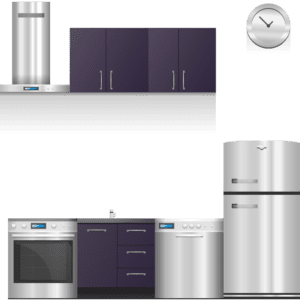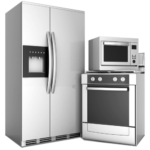As a skilled professional appliance repair expert with years of experience diagnosing and fixing various appliance problems, I have seen personally how crucial it is to extend the life of your cherished equipment. These reliable workhorses, which include anything from refrigerators to washers, are essential in our daily lives. Even the most dependable appliances eventually begin to exhibit signs of wear and tear, though. In this post, I’ll reveal my insider tips for extending the life of your appliances and offer advice on when it might be time to think about replacing them. You can make judgments that will ultimately save you time, money, and needless irritation by being aware of these insightful ideas.

The significance of household appliances in our everyday lives is crucial since they serve as reliable resources in simplifying and performing necessary household duties. From the basic refrigerator that keeps our food fresh to the dependable dishwasher that easily cleans up after itself, these appliances have become indispensable aspects of our daily lives because they provide comfort, efficiency, and convenience.
For household appliances to function at their best and to last a long time, it is essential to understand their lifespan. Appliances may begin to show symptoms of wear and tear over time, which reduces their efficacy and efficiency. To make wise choices, it is crucial to be aware of these symptoms and assess if repair or replacement is feasible.
Although a variety of factors, such as usage habits, maintenance routines, and product quality, affect an appliance’s lifespan, it is crucial to understand the usual lifespan expectations for various equipment. Homeowners may efficiently plan and budget for appliance maintenance or upgrades by knowing when to anticipate probable faults or the need for replacement.
Understanding when to replace your appliances is a key consideration in maintaining a functional and efficient home. While there isn’t a one-size-fits-all answer to this question, several factors influence the lifespan of household appliances. By taking these factors into account, you can make more informed decisions about when to replace your appliances.
Several factors impact the lifespan of appliances, including:
Quality and Brand: The quality and brand reputation of an appliance can significantly influence its longevity. Appliances from reputable brands with a track record of reliability tend to have longer lifespans compared to lower-quality alternatives.
Usage Frequency: Appliances that experience heavy use, such as refrigerators and washing machines, may wear out faster than those used less frequently. Consider how often you use an appliance and factor that into its expected lifespan.
Maintenance and Care: Regular maintenance and proper care can extend the lifespan of your appliances. Cleaning filters, defrosting freezers, and following manufacturer-recommended maintenance practices can prevent premature wear and help appliances operate efficiently for longer.
A malfunctioning fridge freezer can disrupt our daily routines and pose risks to our food safety. That’s why it’s crucial to address any issues promptly and seek professional repair services to restore the optimal functionality of your appliance. Now, let’s explore the factors you should consider when deciding whether to repair or replace your fridge freezer.
While individual circumstances may vary, some general guidelines can help determine when to replace appliances:
Age: Most appliances have an average lifespan, typically ranging from 10 to 15 years. Once an appliance reaches this age, it is worth considering replacement, especially if it starts experiencing frequent breakdowns or requires costly repairs.
Cost of Repairs: If the cost of repairing an appliance exceeds 50% of the cost of a new appliance, it is often more economical to replace it. Consider the repair costs in relation to the appliance’s age and expected remaining lifespan.

Here are some rough estimates of the average lifespans for common household appliances:
Refrigerators: Around 10 to 15 years
Washing Machines: Approximately 10 to 12 years
Dishwashers: Typically 10 to 12 years
Ovens and Ranges: Approximately 15 to 20 years
Dryers: Around 10 to 15 years
It’s important to note that these are general guidelines, and individual appliances may vary based on usage, maintenance, and quality.
By considering the factors affecting appliance lifespan, following general replacement guidelines, and having a sense of the average lifespan for common appliances, you can make more informed decisions about when to replace your household appliances.
When it comes to replacing household appliances, one common question that arises is whether it is more beneficial to replace multiple appliances simultaneously or opt for individual replacements as needed. While the answer may vary depending on individual circumstances, there are several considerations to keep in mind when making this decision.
Efficiency and Compatibility: Replacing multiple appliances at the same time allows for greater efficiency and compatibility within your home. Upgrading all appliances together ensures they are compatible with each other in terms of features, energy efficiency, and design. This can enhance overall functionality and aesthetics, providing a cohesive and harmonious look to your kitchen or laundry area.
Energy Savings: Newer appliances are often more energy-efficient, which can lead to significant savings on utility bills over time. By replacing multiple appliances simultaneously, you can take advantage of the latest energy-saving technologies across all your appliances, maximizing your energy efficiency and reducing your carbon footprint.
Urgency and Condition: If one appliance is significantly older or experiencing frequent breakdowns, it may be more practical to prioritize its replacement. Assess the urgency and condition of each appliance individually to determine if immediate replacement is necessary.
Budget Constraints: Replacing multiple appliances at once can be a significant investment. Consider your budgetary constraints and determine whether your financial situation allows for simultaneous replacements. If budget limitations exist, prioritizing the replacement of essential or high-priority appliances may be a more practical approach.
Cost Savings: While replacing multiple appliances at once incurs a higher initial cost, it can potentially lead to long-term cost savings. Newer appliances often come with improved energy efficiency, reducing energy consumption and lowering utility bills over time. Financing Options: If the upfront cost of replacing multiple appliances is a concern, explore financing options or promotional offers provided by appliance retailers. Many retailers offer financing plans or discounted package deals that can help make simultaneous replacements more affordable.
Replacement Timeline: Evaluate the lifespans and conditions of your appliances to determine if they are nearing the end of their expected lifespan. If multiple appliances are approaching the end simultaneously, it may be more cost-effective to replace them together rather than investing in individual replacements over a short period.
By weighing the benefits of simultaneous appliance replacement, considering the urgency and condition of each appliance, and carefully evaluating financial implications and budgetary constraints, you can make an informed decision about whether to replace appliances at the same time or opt for individual replacements based on your specific needs and circumstances.


When it comes to household appliances, understanding the failure rate is crucial for homeowners. By gaining insights into the statistical overview of appliance failures, the contributing factors to these failures, and the signs indicating potential issues, you can proactively address appliance maintenance and replacement needs.
Appliances, like any mechanical or electronic device, are subject to wear and tear over time. While the actual failure rates can vary depending on various factors, including usage patterns and maintenance practices, it is helpful to have a general understanding of the average failure rates for common household appliances. According to industry statistics:
Refrigerators: The failure rate for refrigerators typically ranges from 10% to 15% within the first ten years of use.
Washing Machines: Washing machines have a failure rate of approximately 15% within the first five years and around 29% within ten years.
Dishwashers: Dishwashers experience failure rates of approximately 20% within the first ten years of use.
Ovens and Ranges: The failure rate for ovens and ranges is estimated to be around 14% within the first ten years.
Several factors can contribute to appliance failures. Understanding these factors can help homeowners take proactive measures to minimize the risk of breakdowns. Common contributing factors include:
Age and Usage: As appliances age and experience heavy usage, their components can wear out, leading to an increased risk of failure. High-frequency usage, such as running the dishwasher multiple times a day or using the washing machine for large loads regularly, can accelerate the wear and tear process.
Lack of Maintenance: Inadequate maintenance practices, such as neglecting to clean filters, coils, or vents, can lead to reduced performance and potential failures. Regular maintenance, as recommended by manufacturers, can help prevent issues and prolong appliance lifespan.
Being aware of the signs that indicate potential appliance failures or declining performance is crucial. Look out for the following indicators:
Unusual Noises: Unusual grinding, squeaking, or rattling noises coming from an appliance may signal underlying issues that require attention.
Inefficiency: Appliances that take longer to complete their tasks or fail to perform at their usual level of efficiency may be experiencing problems.
Frequent Breakdowns: If an appliance requires frequent repairs or experiences repeated breakdowns, it may be approaching the end of its lifespan.
Energy Consumption: A sudden increase in energy consumption without any corresponding changes in usage patterns could indicate an issue with the appliance’s efficiency.
By understanding the statistical overview of appliance failure rates, identifying the contributing factors to failures, and recognizing signs of potential failure or declining performance, homeowners can take proactive steps to address maintenance needs and make informed decisions regarding appliance repair or replacement, ensuring a smoothly functioning household.
When considering whether to invest in new appliances, it’s essential to evaluate the advantages, energy efficiency, cost savings considerations, and overall value proposition. Upgrading to new appliances can offer numerous benefits that enhance your daily life, improve energy efficiency, and potentially save you money in the long run. Let’s explore these factors in more detail.
Improved Performance: New appliances often come equipped with the latest technologies and advanced features that enhance their performance. From faster cooking times to more efficient cooling and washing cycles, upgraded appliances can significantly improve your daily tasks and provide better results.
Enhanced Convenience: New appliances are designed with user convenience in mind. They may offer features such as smart connectivity, touch-screen controls, and programmable settings that make operating them more intuitive and convenient. These advancements can simplify your routines and streamline your household chores.
Modern Design and Aesthetics: Upgrading to new appliances can transform the look of your kitchen or laundry room. Contemporary designs and sleek finishes not only provide a fresh and modern aesthetic but also add value to your home. Whether you prefer a minimalist stainless steel look or a bold color scheme, new appliances offer a range of options to suit your style.
Energy Efficiency: New appliances are designed to meet or exceed strict energy efficiency standards. They utilize advanced technologies, such as improved insulation, better temperature control, and sensor-based operations, to consume less energy while delivering optimal performance. Upgrading to energy-efficient appliances can lead to significant savings on your utility bills over time.
Environmental Benefits: Energy-efficient appliances contribute to reducing greenhouse gas emissions and conserving natural resources. By choosing appliances with high energy efficiency ratings, you’re not only saving money but also making a positive impact on the environment.
Long-Term Cost Savings: While the upfront cost of purchasing new appliances may seem significant, it’s important to consider the long-term cost savings. Energy-efficient models can result in substantial savings on utility bills, offsetting the initial investment over time. Additionally, new appliances typically come with warranties that provide peace of mind and protection against unexpected repair costs.
Lifespan and Reliability: New appliances are built to last and offer improved reliability compared to older models. With proper maintenance and care, they can serve you for many years, providing consistent performance and reducing the need for frequent repairs.
Customization and Features: Upgrading to new appliances allows you to choose features that align with your specific needs and preferences. Whether it’s a refrigerator with adjustable shelves, a dishwasher with specialized cleaning cycles, or a washer with customizable settings, you can tailor your appliance selection to suit your lifestyle.
Resale Value: Upgrading your appliances can enhance the resale value of your home. Modern, energy-efficient appliances are attractive selling points for potential buyers and can give your home a competitive edge in the real estate market.
Investing in new appliances offers a range of advantages, including improved performance, convenience, energy efficiency, cost savings, and enhanced aesthetics. By considering the long-term benefits, such as energy savings and increased home value, and evaluating the specific features and customization options available, you can make an informed decision about whether upgrading to new appliances is worth the investment.
To get the most out of your appliances and extend their lifespan, it’s essential to implement strategies that prioritize regular maintenance, proper care, and timely repairs. By following these strategies, you can ensure that your appliances continue to perform optimally and avoid premature breakdowns. Here are some key approaches to consider:
Regular maintenance is crucial for maximizing the lifespan of your appliances. It involves performing routine tasks that keep your appliances in good working condition and prevent issues from arising. Here’s why regular maintenance and care are important:
Improved Performance: Regular maintenance tasks, such as cleaning filters, coils, and vents, ensure that appliances operate at their optimal level. By removing debris and buildup, you enhance their performance and prevent strain on components.
Early Detection of Issues: Routine maintenance allows you to identify potential problems early on. By inspecting and testing your appliances regularly, you can catch any warning signs or minor issues before they escalate into major breakdowns.
To extend the lifespan of your appliances, consider implementing the following tips:
Read the Manufacturer’s Manual: Familiarize yourself with the manufacturer’s instructions and recommendations for maintenance and care. The manual provides valuable guidance on specific tasks, cleaning methods, and maintenance schedules tailored to your appliances.
Clean Regularly: Keep your appliances clean to prevent dirt, dust, and debris from affecting their performance. Wipe surfaces, remove spills promptly, and clean filters, vents, and coils as recommended by the manufacturer.
Avoid Overloading: Follow the recommended load capacities for your appliances, whether it’s the dishwasher, washing machine, or oven. Overloading can strain the components, leading to premature wear and tear.
Use Proper Settings: Utilize the appropriate settings and cycles for different tasks. For example, choose energy-saving modes, delicate cycles, or appropriate temperature settings based on the requirements of your laundry or cooking needs.
When to Opt for Repair: At some point, you may face the dilemma of whether to repair or replace a malfunctioning appliance. Consider the following factors when making this decision:
Age and Condition: Assess the age and overall condition of the appliance. If it is relatively new and the issue is minor, repair may be a cost-effective option. However, if the appliance is older and experiencing frequent breakdowns, replacement might be a more sensible long-term solution.
Cost of Repair: Evaluate the cost of repairs compared to the value and lifespan of the appliance. If the repair cost is excessively high or close to the cost of a new appliance, it may be more practical to invest in a replacement.
Energy Efficiency: Consider the energy efficiency of the appliance. If it is an older model and consumes a significant amount of energy, replacing it with a more energy-efficient option can lead to long-term cost savings on your utility bills.
By implementing regular maintenance and care, following manufacturer guidelines, and making informed decisions about repair versus replacement, you can maximize the lifespan of your appliances and ensure their continued performance and reliability.
When it comes to replacing your appliances, several important factors should be taken into consideration. By carefully evaluating these factors, you can make a well-informed decision that meets your needs and aligns with your long-term goals. Let’s delve into these considerations together:
Evaluating Replacement Costs vs. Potential Savings Replacing appliances can be a significant investment, so it’s essential to conduct a cost-benefit analysis. Compare the cost of purchasing new appliances with the potential savings they may offer. Consider factors such as improved energy efficiency, reduced repair costs, and the overall lifespan of the new appliances compared to your current ones.
Energy efficiency is a crucial aspect to consider when replacing appliances. Newer models often come with enhanced energy efficiency standards, which can lead to substantial savings on your utility bills over time. Evaluate the potential impact on your energy consumption and calculate the long-term savings associated with more energy-efficient appliances.
Dynamics Take a moment to reflect on any recent lifestyle changes or shifts in your household dynamics. Consider whether your current appliances adequately meet your evolving needs. For instance, if your family has grown in size, you might require appliances with larger capacities. Similarly, changes in dietary preferences or increased frequency of appliance usage might warrant upgrading to appliances that offer specific features tailored to those needs.

Preserving our environment is of utmost importance. When replacing appliances, it’s crucial to factor in environmental considerations. Explore responsible disposal options for your old appliances to minimize their impact on the environment. Look for local recycling programs or donation centers that can help ensure your old appliances are disposed of properly.
Additionally, consider the eco-friendliness of the new appliances you’re considering. Look for models that prioritize sustainability and energy efficiency. Appliances with water-saving features or energy-saving modes can not only benefit the environment but also contribute to reduced utility bills in the long run.
By taking environmental considerations into account, you can make a more conscious choice that aligns with your values and helps reduce your carbon footprint.
Remember, before making any final decisions, it’s crucial to thoroughly research and evaluate all factors that are important to you. By doing so, you can confidently choose the best appliances that meet your needs, provide long-term value, and have a positive impact on your daily life and the environment.
When it comes to making decisions about appliance replacement, hearing from individuals who have already gone through the process can provide valuable insights. Here are some real experiences and testimonials from consumers who have replaced or upgraded their appliances:
Sarah from Toronto: “Upgrading our refrigerator was a game-changer for our family. The old one was constantly breaking down, and we were tired of spoiled food and costly repairs. We invested in a new energy-efficient model, and not only did it provide ample storage space, but it also helped us save on our monthly energy bills. The peace of mind that comes with reliable cooling and reduced costs has made a significant difference in our daily lives.”
Mark from Richmond Hill: “Replacing our old washing machine with a newer model was a fantastic decision. The old one was inefficient and consumed excessive water and energy. The new washing machine has advanced features like load sensing and different wash cycles, allowing us to customize our laundry needs. Not only does it clean clothes better, but it also saves us time and money in the long run. It’s a worthwhile investment that has improved our laundry routine.”
Emilly from Toronto: “We recently upgraded our kitchen appliances, including the stove, dishwasher, and microwave. The previous appliances were outdated and lacked the latest features. The new ones have made cooking and cleaning a breeze. The convection oven in the stove cooks food more evenly and quickly, the dishwasher has various wash options for different loads, and the microwave has sensor cooking for perfect reheating. Our kitchen now feels modern and efficient, and it has added value to our home.”
Michael from Etobicoke: “After years of struggling with our old air conditioner, we decided it was time for an upgrade. The constant repairs and rising energy costs were becoming unbearable. We opted for a new energy-efficient unit with smart thermostat control. Not only does it cool our home more effectively, but we can also manage the temperature remotely through our smartphones. It has been a game-changer during hot summer days, and we’ve noticed a significant reduction in our energy bills.”
These are just a few examples of real experiences from consumers who have replaced or upgraded their appliances. Each person had unique needs and goals, and their decision to invest in new appliances brought them specific benefits and improved their daily lives.
It’s important to consider these insights alongside your own preferences, requirements, and budget. While these experiences can provide guidance, ultimately, the decision to replace or upgrade appliances should be based on your individual circumstances and goals. Conduct thorough research, compare different models, and consult with experts to make an informed choice that suits your needs and enhances your home environment
After exploring the various aspects of appliance replacement, it is essential to recap the key points discussed and emphasize the importance of making informed decisions while balancing multiple considerations.
Throughout this article, we’ve highlighted the significance of evaluating factors such as the lifespan of appliances, the failure rate in homes, and the advantages of getting new appliances. We’ve also delved into practical strategies for maximizing appliance lifespan, factors to consider before replacement, environmental considerations, and the role of technological advancements. Moreover, we’ve discussed the financial implications, consumer experiences, and the assessment of long-term savings and return on investment.
It is clear that when it comes to appliance replacement, there is no one-size-fits-all approach. Each household has unique needs, preferences, and budgets. By conducting a thorough cost-benefit analysis, considering energy efficiency standards, understanding lifestyle changes, and factoring in environmental considerations, you can make a more informed decision that aligns with your values and priorities.
Additionally, gathering insights from other consumers who have already replaced their appliances and consulting with experts in the field can provide valuable perspectives to guide your decision-making process.
In conclusion, it is crucial to approach appliance replacement with a well-rounded understanding of the various factors at play. By carefully considering the lifespan of your appliances, the benefits of getting new ones, environmental considerations, and other relevant factors, you can strike a balance that meets your needs and aligns with your long-term goals.
Remember, making an informed decision requires thorough research, thoughtful consideration, and weighing the pros and cons. By taking these steps, you can confidently navigate the appliance replacement process and make choices that enhance the functionality, energy efficiency, and overall satisfaction of your home.
Ultimately, the goal is to find the right balance that optimizes the performance of your appliances, aligns with your budgetary constraints, and contributes to a sustainable and efficient household.
At ARNI, we are aware that selecting an appliance for repair or replacement can be difficult. We are here to help you along the journey as a result. Our team of skilled specialists will offer professional support whether you decide to repair or replace your appliances.
Our professionals will thoroughly examine the problem when it comes to appliance repair and give you a frank assessment of whether it is worthwhile to fix your appliance. We value openness and want to make sure that you choose wisely depending on the state, efficiency, and durability of your appliance. If repair is the appropriate course of action, our qualified technicians will use their knowledge to quickly address the issue and return your appliances to working shape.
On the other hand, if you choose to buy new appliances, our committed professionals are available to make sure the installation goes smoothly and correctly. We are aware of how crucial it is to install your new appliances properly in order to prevent future problems. Our installers are trained and skilled to perform installations precisely, making sure that your new appliances are connected, positioned, and prepared for usage.

In order to provide excellent service, we at ARNI place a great importance on client satisfaction. Our staff members are trained to put your requirements first, offer straightforward guidance, and complete work of the greatest level. Our experts will assist you with the repair or replacement process while giving you sound recommendations and choices that are in your best interests.
We invite you to make an appointment with one of our technicians in order to go forward and take advantage of our experience. We are available to help you with appliance installation or repair. Find a convenient time for our technicians to visit your home by getting in touch with our helpful customer care team.
Make the best choice for your appliances knowing that ARNI professionals are there to offer you frank assessments, speedy fixes, and expert installations. Our primary focus is making sure you are satisfied, and we are eager to assist you and make sure your appliances are operating at their best.
If your are concerned with your appliances performance, don’t hesitate to contact our professionals at ARNI Services, Appliance Repair for a full diagnose and repair service.
If your are concerned with your appliances performance, don’t hesitate to contact our professionals at ARNI Services – Appliance Repair for a full diagnose and repair service – you can’t put a price tag on peace of mind.